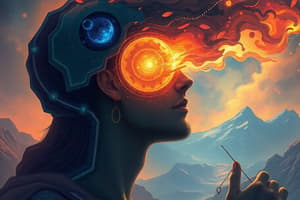Podcast
Questions and Answers
Which philosopher is associated with the idea that the self is constructed through experiences?
Which philosopher is associated with the idea that the self is constructed through experiences?
- Sigmund Freud
- Rene Descartes
- Immanuel Kant (correct)
- Gilbert Ryle
What does Sigmund Freud identify as a component of the self?
What does Sigmund Freud identify as a component of the self?
- Universal self
- Social self
- Conscious and unconscious selves (correct)
- Aesthetic self
According to Charles Horton Cooley, how is the self developed?
According to Charles Horton Cooley, how is the self developed?
- Through individual resilience
- Through societal institutions
- Through the looking-glass process (correct)
- Through biological factors
What is the viewpoint of David Hume regarding the existence of the self?
What is the viewpoint of David Hume regarding the existence of the self?
Which of the following reflects the anthropological view of the self?
Which of the following reflects the anthropological view of the self?
Flashcards are hidden until you start studying
Study Notes
The Concept of "the Self"
- "Self" refers to the individual's perception of themself, including their thoughts, feelings, and behaviors.
- It is a complex concept with various perspectives across disciplines.
Self-Concept
- Self-concept is an individual's understanding of who they are, encompassing their beliefs, values, and attitudes.
Philosophical Perspectives on the Self
-
Philosophy literally translates to "love of wisdom", emphasizing a pursuit of knowledge and understanding.
-
Socrates famously said that "an unexamined life is not worth living", highlighting the importance of self-reflection.
-
Plato believed in the immortality of the soul, suggesting that self transcends the physical body.
-
Modern Perspectives on the Self*
-
Rene Descartes famously declared "Cogito, ergo sum" ( I think, therefore I am), emphasizing the self as a thinking entity
-
John Locke viewed the self as consciousness, acknowledging its continuous nature.
-
David Hume argued that there is no permanent self - our experiences are fleeting and constantly changing
-
Immanuel Kant believed that the self is constructed through experience and interaction with the world.
-
Sigmund Freud proposed the existence of two selves: a conscious self we are aware of and an unconscious self hidden from our awareness.
-
Contemporary Views on the Self*
-
Gilbert Ryle argued that the self is not a separate entity but a collection of behaviors and actions.
-
Paul Churchland suggested that the self is reducible to brain activity.
-
Maurice Merleau-Ponty emphasized the embodied nature of the self, interconnected with its environment.
The Social Self (Sociology)
- George Herbert Mead emphasized the social construction of self, suggesting it develops through interactions with others.
- Charles Horton Cooley's "looking-glass self" theory highlights how we see ourselves through the eyes of others.
The Anthropological Conceptualization of the Self
- Anthropology investigates how cultures shape the understanding and experience of self.
- The self is embedded in culture, influenced by social norms, beliefs, and practices.
Culture and the Self
- Culture is the shared patterns of behavior, beliefs, and values within a group.
- Non-material culture, encompassing ideas, values, and beliefs, is crucial to understanding the self within a specific culture.
- Cultural artifacts provide insights into how societies view themselves and their social reality.
- Important examples include: art, language, music, rituals, and literature.
Characteristics of Culture
- Culture is learned, acquired through observation, experience, and social interaction.
- Culture is shared, passed down from generation to generation through socialization and tradition.
- Culture is dynamic, constantly adapting and evolving in response to changes in society and the world around it.
- Culture is diverse, reflecting the vast array of human experiences and perspectives around the globe.
Studying That Suits You
Use AI to generate personalized quizzes and flashcards to suit your learning preferences.




